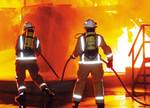9/11 provides health lesson for Adelaide firefighters
 Health Sciences Health Sciences
Adelaide's firefighters are being offered annual lung function tests by the University of Adelaide as part of an overall "wellness" program introduced by the South Australian Metropolitan Fire Service (MFS). Believed to be a first in Australia, the establishment of a lung function monitoring program in South Australia follows findings of accelerated lung damage in emergency service personnel who were involved in the rescue and clean-up after the terrorist attacks in the United States on 11 September 2001 (9/11). "Everyone loses some lung function after the age of 25. In the five years following 9/11, the New York firefighters involved had an accelerated rate of loss of lung function of up to 12 times greater than the average non-smoking person," said Associate Professor Alan Crockett, who is Director of the University of Adelaide's Primary Care Respiratory Research Unit. "A key factor in the New York firefighters' case is that five years before September 2001 they put in place a regime of lung function testing. That gave them the base-line information which clearly showed the damage done to individual firefighters by 9/11. "This prompted the view that a baseline - or starting point - measurement of lung function should be available for Adelaide firefighters. We will then be able to assess the impact of any future exposures to potentially damaging substances. At the moment, if there was lung damage, we wouldn't know how much was caused by exposure and how much was pre-existing. "The main concern of the MFS is to look after the health and wellbeing of firefighters. As well as helping individuals to track their health, this data will provide objective measures of the efficiency of current protocols around breathing apparatus and effectiveness of masks and ventilators." Deputy Chief Fire Officer Mick Smith said that in line with the State Strategic Plan, the MFS, in partnership with the University of Adelaide, was introducing lung testing to improve firefighter wellness. Lung function testing will be voluntary and offered to all of the approximately 800 MFS firefighters. Individual information will be confidential to each firefighter with the MFS receiving only summary overall results. The testing will involve two simple breathing tests. Story by Robyn Mills
|





